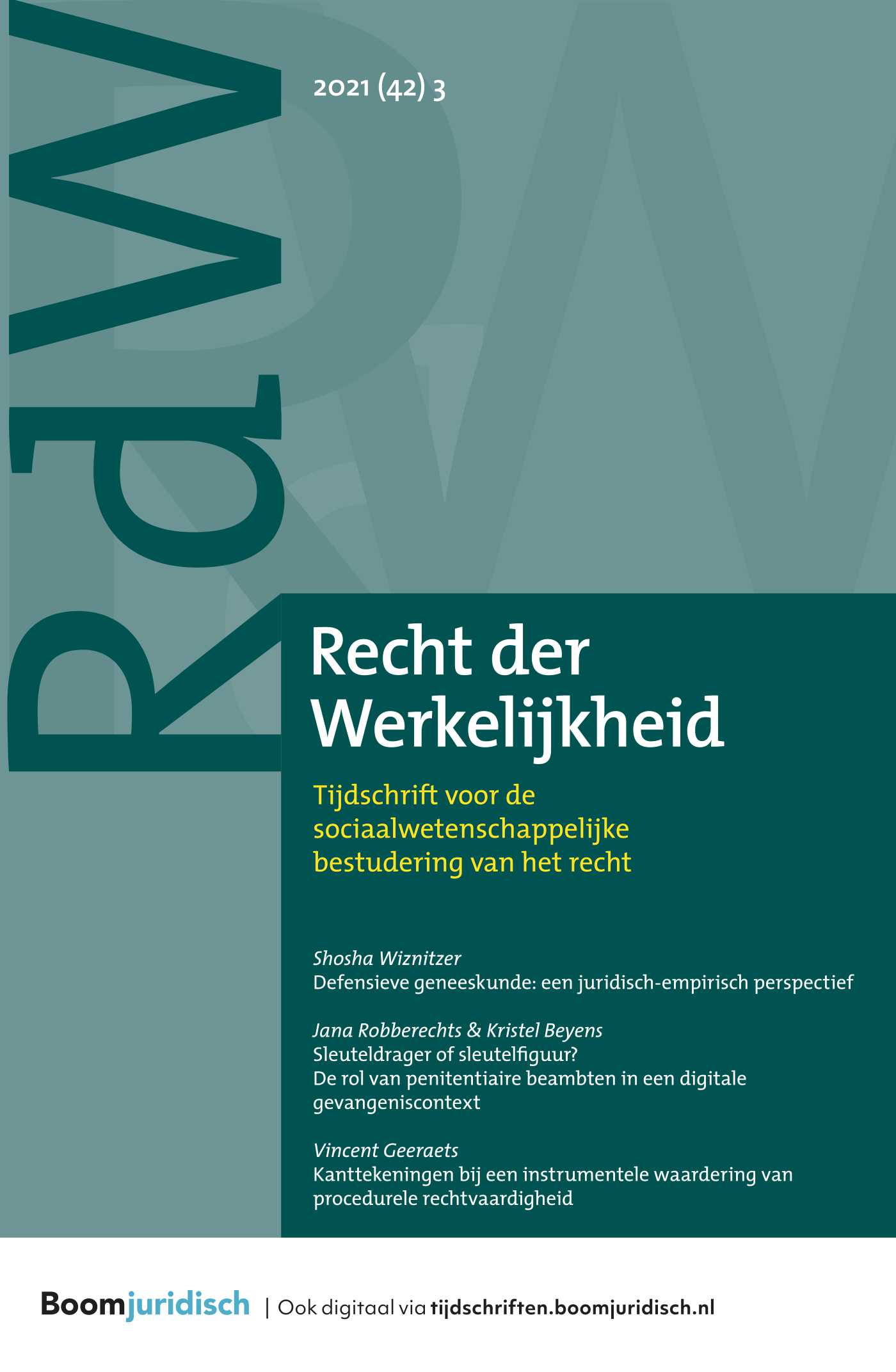|
This editorial offers an introduction to the current issue. |


Recht der Werkelijkheid
Meer op het gebied van Algemeen
Over dit tijdschriftMeld u zich hier aan voor de attendering op dit tijdschrift zodat u direct een mail ontvangt als er een nieuw digitaal nummer is verschenen en u de artikelen online kunt lezen.
| Redactioneel |
Is that all there is?Over recht in de coulissen |
| Auteurs | Robert Knegt |
| SamenvattingAuteursinformatie |
| Artikel |
Simulatie onder slachtoffers van schokkende gebeurtenissenEen pleidooi voor onafhankelijk onderzoek naar de echtheid van psychische klachten in schadevergoedingsprocedures |
| Trefwoorden | victims, compensation, malingering, detection |
| Auteurs | Maarten Kunst |
| SamenvattingAuteursinformatie |
|
High-impact incidents, such as (natural) disasters, severe (traffic) accidents, and exposure to (war) violence, may have severe psychological consequences, both for direct and indirect victims. Such consequences may qualify for financial compensation. However, some victims malinger their psychological status to get compensated for damages they have not suffered. This type of fraudulent behavior costs insurance companies and publicly funded compensation services enormous amounts of money and may eventually make compensation unaffordable. To prevent this from occurring, it is argued that lawyers who need to decide upon victims’ claims for compensation should call in independent experts to evaluate the genuineness of victims’ reported psychological symptoms by administrating a malingering detection test. To enable correct interpretation of the outcome of such a test, the base rate problem is extensively discussed. In short, this problem means that correct test interpretation in individual cases depends on the prevalence of malingering in the population to which a victim belongs. Finally, several counter arguments for the standard assessment of malingering by independent experts are discussed. |
| Artikel |
Scripts, de voertuigen van kennis |
| Trefwoorden | knowledge of law, scripts, medical treatment at the end of life, findings of empirical research |
| Auteurs | Heleen Weyers en Donald van Tol |
| SamenvattingAuteursinformatie |
|
This article presents the results of a study into the knowledge of doctors regarding three kinds medical treatment regulation at the end of life, the so-called KOPPEL study. One of the findings of this study is that most doctors know the law that regulates ending life at request (euthanasia) and guideline for palliative sedation quite well. However, hardly any of them know Book 7, Section 450.3 of the Dutch Civil Code, the section that regulates written treatment refusals. Apart from the description of the findings, we elaborate on three reasons that Aubert distinguishes for knowledge of the law: the period the regulation exists, the congruence between habits and norms of the law, and experience with the law. We conclude that Aubert’s factors do indeed explain the differences in knowledge of the doctors. In the discussion we come to the conclusion that sociology of law should not only pay attention to ‘what knowledge of the law is’ (Griffiths, Van Tol) and ‘which factors influence this knowledge’ (Aubert) but also to ‘how knowledge of law can be ascertained’. In our opinion the idea of scripts, as introduced by Schank and Abelson, can be of great help in this respect. |
| Praktijk |
Understanding knowledge sharing between judgesA quantitative analysis |
| Trefwoorden | knowledge exchange, knowledge sharing behavior, knowledge management system, judicial knowledge |
| Auteurs | Sandra Taal PhD |
| SamenvattingAuteursinformatie |
|
Over the last two decades, there has been a growing interest in the development and implementation of knowledge management systems. In the judicial context, these knowledge management systems are designed to support judges in the decision-making process by providing them with the knowledge that they need in order to deal with doubts or uncertainties in complex cases. However, less attention has been given to the related process of knowledge sharing between judges. In order to optimally benefit from the knowledge available in the organization, this process should be better understood and acted upon. The aim of this research project is to gain a better insight into the interactive process of knowledge sharing between judges. To this end, a research model has been developed which will be quantitatively tested on the basis of survey responses from judges. |
| Boekbespreking |
Preventie of paranoia?Een parodie op het ‘voorzorgsdenken’ |
| Auteurs | Jan Popma |
| SamenvattingAuteursinformatie |
|
In this feature authors review recently published books on subjects of interest to readers of Recht der Werkelijkheid. |
| Boekbespreking |
Ervaringen uit de collegezaalEen verslag van de discussie over rechtssociologisch onderwijs in Nederland |
| Trefwoorden | Sociology of law, Socio-legal education, Educational practices |
| Auteurs | Reyer Baas |
| SamenvattingAuteursinformatie |
|
When Dutch-speaking sociologists of law meet, actual research is heavily discussed. Education, unfortunately, is rarely a topic of discussion. In 2014 sociologists of law gathered to exchange experiences in and ideas on education. This article gives an account of the discussion. |
